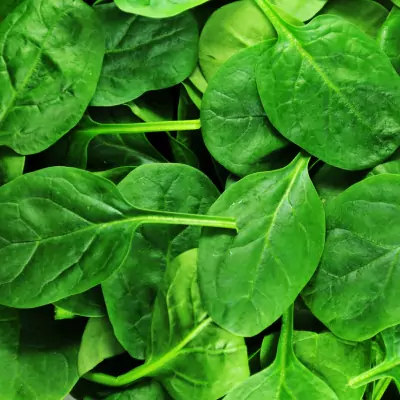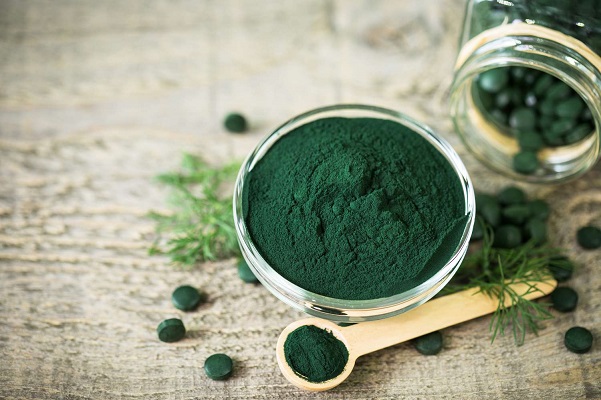On This Page
Overview
The famous green vegetable spinach is packed with vitamins and minerals. It contains a variety of vitamins and minerals and is rich in iron. Spinacia oleracea is the scientific name for this cruciferous vegetable, which has Persian roots. However, it is now accessible everywhere. The top spinach growers are China and the United States.
It is well known for controlling blood pressure, preventing cancer cells, and enhancing vision. Due to its nutrient content, spinach has numerous health advantages and is one of the superfoods. In addition to being rich in vitamins and minerals, it is also packed with phytonutrients that are good for our health, such as flavonoids and carotenoids (such as beta-carotene, lutein, and zeaxanthin), all of which offer us strong antioxidant defense.
Synonyms of Spinach
- Palong
- Palak
- Spinacia oleracea
- Sag
Nutritional Facts of Spinach
One cup of palak contains:-
| Fat: | 0 grams |
| Calories: | 7 |
| Carbs: | 1 gram |
Phytochemical Constituents of Spinach
- Phitobatamin
- Saponins
- Phenol
- Tannins
- Glycosides
- Flavonoids
- Steroids
- Terpenes and cardenolides
Therapeutic Uses of Spinach
- Aid in Cancer
Strong antioxidant kaempferol found in spinach lowers the chance of developing cancer. Studies suggest that spinach may help stop breast and prostate cancer. Additionally, it inhibits the development of tumors by slowing down tumor growth.
- Beneficial for Eyes
Lutein and zeaxanthin, two antioxidants incorporated in spinach, aid in maintaining good vision. Additionally, it shields you from eye issues including cataracts and age-related macular degeneration. It is a healthy source of vitamin A which is an essential for vision.
- Good for Anemia
Iron, a mineral that is essential in evading anemia, is abundant in spinach. Iron is very helpful for the patients with anemia therefore it is said that you should eat spinach if you are an anemia sufferer.
- Control Asthma
According to studies, those who consume large amounts of specific nutrients, such as the antioxidant beta-carotene, are less likely to acquire asthma. And spinach is a fantastic food source for this vitamin.
- Healthy and strong bones
Bone health could be improved by spinach. Spinach contains abundant calcium and vitamin K, two elements vital for strong bones.
Osteoporosis might also result from a lifetime of inadequate calcium intake. Fast bone loss and low bone mass are all associated with it. Calcium is present in spinach, which can help combat this.
Home Remedies Spinach
- Constipation
Palak or spinach is very beneficial for constipation. To cure it 100 ml of spinach juice should be squeezed out and combined with an equal volume of water. This fresh mixture may be consumed twice daily.
- Stops Acne
Try eating some spinach if you have acne; it will help to ease the inflammation and clear up your skin. You can create a paste of spinach and water as a mask. Apply it to your face and stay for 10 minutes after completion. This paste clears all your pores and acne and scars too.
- Hair loss
Spinach increases hair growth and reduces hair loss. you can make a hair mask of spinach to contain hair fall
- Create a paste by blending water and some spinach leaves.
- Spread it to your scalp and let it sit there for a minimum of 3 to 4 hours.
- Use herbal shampoo and plain water to wash it.
- To stop hair loss, do it once a week.

Have A Health Issue?
Consult Online
- Dr. Sahil Gupta (B.A.M.S., M.H.A.)
Ayurvedic Allergy Specialist
CEO & Founder of IAFA®
Ayurvedic Aspects of Spinach
In terms of Ayurveda, spinach possesses characteristics similar to those of picchila, which lessen the dryness of hair. Spinach also has cooling (Sheeta) and healing (Ropan) characteristics that help with sunburn. In the digestive system, spinach is drying and heating. Some foods are astringent and spicy, making them uncommon. Oxalic acid, which it contains and which aggravates Pitta, is specifically a condition for kidney stones. Oxalic acid is destroyed during cooking.
Daily Dose: 1 cup spinach or 1/2 cup cooked is enough per day.
Side Effects of Spinach
- Kidney Stones
Spinach has a lot of oxalic acids. The body absorbs the purines, a substance found in spinach, from spinach and converts them to uric acid. This uric acid then results in calcium precipitation in the kidneys, which could lead to kidney stones.
- Low Blood Pressure
Spinach overdose can result in low blood pressure.
- Worsen Signs of Gout
Spinach includes purines, which are a class of chemicals linked to gout. However, there isn’t a strong link between eating purine-rich foods and getting gout.
- Diarrhea
Your digestive system can frequently become upset if you consume too much fiber. Palak can also cause loose stools or stomach discomfort if it is used with high-fiber foods. To balance the amount of fiber in the palak, combine it with proteins and other nutrients, it will help you to avoid Diarrhea also.
Conclusion
A fantastic low-calorie superfood that is full of different vitamins and minerals is spinach. It might aid in preventing chronic illnesses. Additionally, spinach is a simple item to incorporate into your diet due to its health-promoting qualities. But be aware of its negative effects too before using it. Before usage, give them a thorough wash. Also, be attentive to any negative side effects. However, spinach can help your health in a variety of ways if you use it properly and in sufficient amounts. Count spinach to your diet to reap its many health advantages while also enjoying delectable spinach-based meals. You can talk to Dr. Gupta at IAFA if you notice any negative effects after consuming spinach or if you are allergic to it you will be treated naturally with ayurvedic herbs and medications.
References
- World’s Healthiest Foods: “Spinach”
- https://www.researchgate.net/publication/336568422_Phytochemical_Analysis_and_Antibacterial_Activities_of_Spinach_Leaf#:~:text=The%20presence%20of%20phytochemicals%20including,determined%20in%20the%20Spinacia%20oleracea









